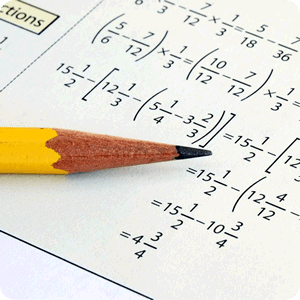Class 8 Exam > Class 8 Notes > Social Studies (SST) Class 8 > Short Notes - Judiciary
Class 8 Civics Chapter 5 Notes - Judiciary
Introduction
India's judiciary boasts the distinction of being one of the world's largest, serving a population of over a billion people. With its commitment to upholding the rule of law, the judiciary plays a pivotal role in safeguarding democratic principles and ensuring justice for all citizens.
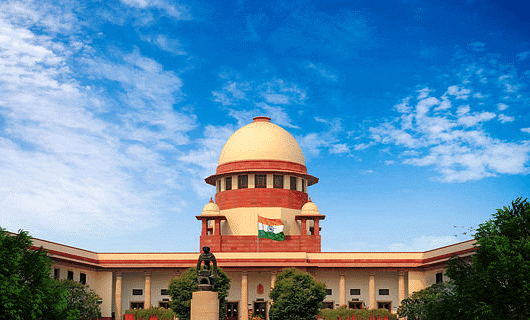 Supreme Court of India Delhi
Supreme Court of India Delhi
What is the Role of the Judiciary?
The Indian judiciary is like the fairness referee, making sure everyone plays by the rules. It protects our rights and keeps the legal game fair for everyone.
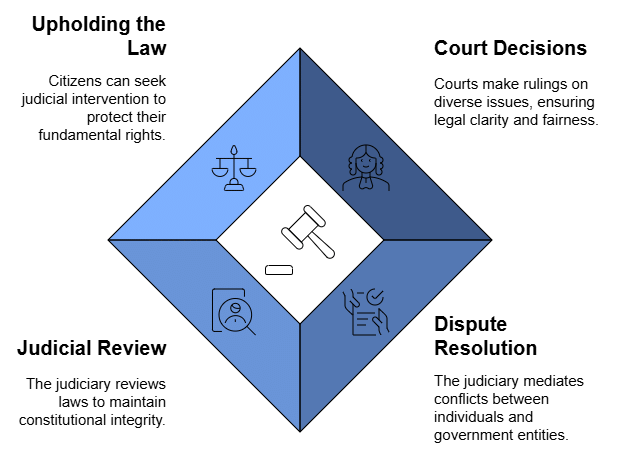
- Court Decisions: Courts make decisions on various issues, such as student-teacher interactions or sharing river waters between states.
- Dispute Resolution: Judiciary resolves conflicts between citizens, citizens and the government, state governments, and between the center and state governments.
- Judicial Review: As the Constitution's final interpreter, the judiciary can reject laws violating the Constitution's basic structure through judicial review.
- Upholding the Law: Citizens can seek Supreme Court or High Court intervention if they feel their Fundamental Rights are violated, like the case of Hakim Sheikh, ensuring the Right to Health.
Question for Short Notes - Judiciary
Try yourself:What is the role of the Indian judiciary?
View Solution
What is an Independent Judiciary?
In a democracy, a fair and independent judiciary ensures justice without bias. It protects our rights and uphold the law with impartiality.

- Challenging Situation: Imagine a powerful politician encroaching on your family's land with control over judge appointments.
- Judicial Independence: Despite the politician's influence, the Constitution safeguards against biased judgments by ensuring the judiciary's independence.
- Separation of Powers: The Constitution's key feature prevents interference from the legislature and executive, maintaining the judiciary's autonomy.
- Judge Appointments: Crucial for the separation to work, judges in High and Supreme Courts need minimal interference in their appointments.
- Protecting Rights: Judicial independence plays a vital role in preventing power misuse and protects citizens' Fundamental Rights.
What is the Structure of Courts in India?
Court Hierarchy India has three levels of courts - subordinate or district courts, High Courts at the state level, and the Supreme Court at the apex level.
- Integrated Judicial System: Decisions made by higher courts are binding on lower courts, creating an integrated judicial system.
- Appellate System: A person can appeal to a higher court if they believe the judgment passed by the lower court is unjust.
- Case Example - State (Delhi Administration) vs Laxman Kumar and Others (1985)
- Supreme Court Authority: Decisions made by the Supreme Court are binding on all other courts in India.
 High Court of Allahabad
High Court of Allahabad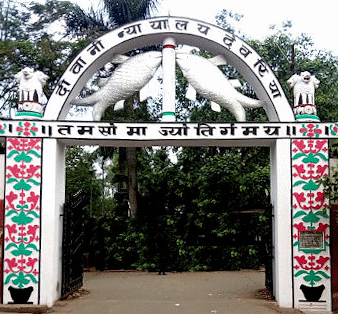 Subordinate Court of Deoria
Subordinate Court of Deoria
Question for Short Notes - Judiciary
Try yourself:
What is the highest level of court in India?View Solution
 |
Download the notes
Short Notes - Judiciary
|
Download as PDF |
Download as PDF
What are the Different Branches of the Legal System?
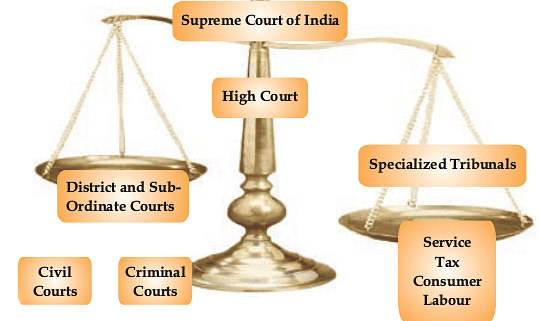 Branches of Legal System
Branches of Legal System
Does Everyone Have Access to the Courts?
Every Indian citizen theoretically has the right to seek justice through the courts, which play a crucial role in safeguarding Fundamental Rights.
- Judicial Structure: There are three levels of courts in India: subordinate or district courts, High Courts, and the Supreme Court. The subordinate courts handle most cases, while the High Courts serve as the highest court in each state, and the Supreme Court is the apex court of the country.
- Challenges in Access to Courts: While the courts are available for all, access to courts is often difficult for many poor individuals in India due to factors like cost, paperwork, and time constraints.
- Public Interest Litigation (PIL): To address these challenges, the Supreme Court introduced Public Interest Litigation (PIL) in the early 1980s, enabling individuals or organisations to file cases on behalf of those facing rights violations.
- Court's Impact on Policies: Through PILs, courts have influenced policies, including the mid-day meal scheme in schools, interpreting Fundamental Rights to include the Right to Food.
- Concerns and Criticisms: Some court decisions, particularly regarding housing rights, have faced criticism for perceived biases, and the long duration of court cases raises concerns encapsulated in the saying, 'justice delayed is justice denied.'
- Judiciary's Crucial Role: Despite challenges, the judiciary is essential in checking the powers of the executive and legislature while protecting citizens' Fundamental Rights, as envisaged by the members of the Constituent Assembly. The independence of the judiciary allows the courts to prevent misuse of power.
- Judicial Functions: The judiciary's work can be broadly categorised as follows:
- Dispute Resolution: The judicial system provides a mechanism for resolving disputes among citizens, between citizens and the government, between state governments, and between the central and state governments.
- Judicial Review: The judiciary has the power to strike down laws passed by Parliament if they violate the basic structure of the Constitution, known as judicial review.
Question for Short Notes - Judiciary
Try yourself:
What is the purpose of Public Interest Litigation (PIL) in the Indian legal system?View Solution
The document Class 8 Civics Chapter 5 Notes - Judiciary is a part of the Class 8 Course Social Studies (SST) Class 8.
All you need of Class 8 at this link: Class 8
|
69 videos|426 docs|46 tests
|
FAQs on Class 8 Civics Chapter 5 Notes - Judiciary
| 1. What is the primary role of the judiciary in a democratic society? |  |
| 2. Why is an independent judiciary important for democracy? |  |
Ans. An independent judiciary is crucial for democracy as it ensures that the judicial system operates free from external pressures, influences, or biases. This independence allows judges to make impartial decisions based solely on the law and facts of the case, which reinforces public confidence in the justice system. It protects individuals' rights and liberties, ensuring that the government acts within its constitutional limits and upholds the principles of fairness and equality before the law.
| 3. What is the structure of the court system in India? |  |
Ans. The structure of the court system in India is hierarchical. At the top is the Supreme Court, which is the highest judicial authority. Below it are the High Courts at the state level, which hear appeals and significant cases. Further down are the District Courts, which handle civil and criminal cases at the district level. Additionally, there are various specialized courts and tribunals that deal with specific types of disputes, such as consumer courts and family courts.
| 4. What are the different branches of the legal system in India? |  |
Ans. The different branches of the legal system in India include civil law, criminal law, constitutional law, administrative law, and international law. Civil law deals with disputes between individuals or organizations, while criminal law pertains to offenses against the state. Constitutional law focuses on the interpretation and application of the Constitution, administrative law governs the actions of public authorities, and international law deals with the rules governing relations between nations.
| 5. Does everyone have equal access to the courts in India? |  |
Ans. While the Constitution of India guarantees the right to access the courts for all individuals, in practice, access may be limited due to various factors such as economic constraints, lack of legal awareness, and geographical barriers. Efforts have been made to improve access, such as legal aid services for the underprivileged, but challenges remain in ensuring that every individual can effectively exercise their right to seek justice.
Related Searches



